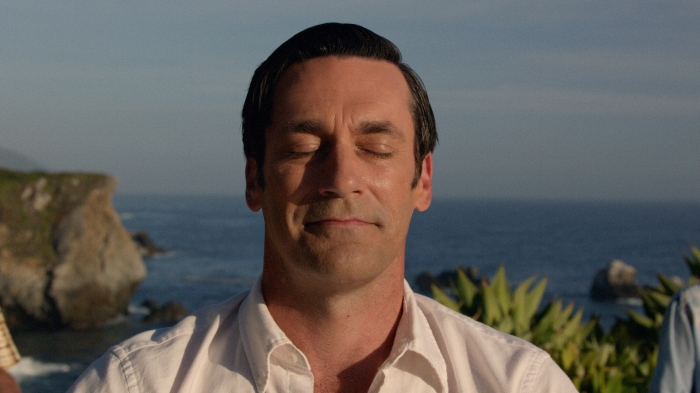**SPOILERS**
A man sits alone at a hotel restaurant smoking a cigarette. He's classically handsome in a way that went out of style with black and white cinema. It's 1959, and Don Draper (Jon Hamm) is the most talented advertiser in a city full of talented advertisers. Years later, the same man races across the Utah salt flats in a stock car. His face is now wind-battered and saturated with alcohol, his bangs swept messily across his forehead. Years of malaise have made him sweaty and desperate. This is not the face of a happy man. It probably never was.
Through eight years, seven seasons, and 92 episodes, Mad Men’s existential question has always been the same: “Will Don ever break his cycle of self-destruction and make peace with his past?” In its final hour, the answer becomes an undefinitive “maybe.” The time in between the pilot and the finale has seen Don's gradual downfall, and consequently the decline of a generation of people like him—those who are stuck in the nostalgia and sentimentality of the past. The 1960s marked a cultural shift away from the wholesome ideals of the ’50s into a decade of more radical actions and ideologies, but the only permanent changes that Don has experienced are those of circumstance rather than mentality—he goes from being an unhappily married man to an unhappily single man and back again.
And what, exactly, does happiness mean beyond the abstract sense? The endings given to the rest of Mad Men's sprawling cast attempt to answer this. Peggy (Elisabeth Moss) and Joan (Christina Hendricks), for instance, who realize that there's more to life than solely work or family;instead, they both find happiness in the balance between the two. Roger (John Slaterry) and Pete (Vincent Kartheiser) are able to learn from their past indiscretions, and can then maturely decide that their lives are better when they’re not constantly chasing after something new in their personally and professionally. Betty (January Jones) has, after being diagnosed with terminal lung cancer, finally gathered the inner strength to live life on her own terms, bravely continuing her personal development and ensuring her children have a stable future.
Really, the only major character who doesn't get a definitively happy ending is Don, who spends the entirety of the finale separated from the rest of the cast and is unable to reach closure with anyone. While it may seem strange for a series' final episode to have no in-person interaction between its protagonist and any other supporting characters, it certainly isn’t surprising. There's an idea common to both East Asian philosophy and Alcoholics Anonymous that one cannot make peace with themselves nor others without great personal sacrifice. Even as Don sits with a blissful smile across his face and his back to the Pacific Ocean, resting in some remote California meditation seminar after having lost everything that tethered him to the real world, he has not ascended to a higher plane of happiness nor self-acceptance. It is not the smile of a man who has made peace with his demons or his past. Instead, it’s the smile of a man who has finally discovered how to monetize happiness.
As he sits cross-legged repeating the simple mantra of Transcendental Meditation, the scene cuts to the famous Coca-Cola commercial, "I'd Like to Buy the World a Coke," where a pan-cultural group of people stand in field and sing together about world unity. It's one of the most successful, recognizable ad campaigns of all time, and Mad Men creator Matthew Weiner audaciously attributes its creation to a fictional character. Its overlapping harmonies close out the episode, daring the viewer to believe in a world that can come together under the umbrella of a sugary beverage. The amount of irony that undercuts the scene depends on how optimistic you are about the future, and more specifically, Don's future. Don has found tranquility, he has found happiness, and he has put a price on both and sold them to the world. Are peace and profitability mutually exclusive? For the sake of Don's soul, hopefully not.









Best take on the show I’ve read anywhere. Bravo.